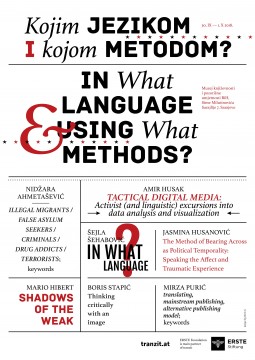In what language and using what methods?
Working Session in Sarajevo
The Dayton Peace Agreement placed the question of language and translation at the epicentre of political reality in Bosnia and Herzegovina: the governing version of the constitution is in English and the High Representative is the final interpreter of the civilian aspects of the matters that Agreement covers.
Through everyday interventions that distract and insist on disinformation, the
ethno-nationalist oligarchies shape the vocabulary of politics, economics, and
culture – tactics through which they normalise social inequality. These agents of power and capital manipulate language in order to continue to extract value from political projects that were founded on concentration camps and mass graves. In what language and using what methods do we fight for a more just social transformation in Bosnia and Herzegovina today?
The working session ‘In what language and using what methods?’ draws together cultural workers who take as a starting point that, in Bosnia and Herzegovina, language and translation are pivotal in a collective exploration that aims to address how to transform the current socio-political status-quo. In such an exploration, maintaining and valuing our own capacities is crucial.
In Bosnia and Herzegovina, when even language, in the linguistic sense, is
equated with ethnicity, there is no public language through which justice for the destroyed Yugoslav sociality and the stolen social property of all citizens in the war and genocide can socially be claimed.
The aim of the session is to map and contextualise, through individual interventions and discussions that are located at the intersection of art-theory-activism, keywords and concepts that have helped us to imagine and produce different social relations in the past 20 years.
What genres and strategies have enabled us to translate everyday experiences of associating labour and resources into new concepts which can help us overcome resignation and hopelessness? Who do we address and, in our individual and collective interventions, how do we address them? How helpful is historical legacy in our work? How do we articulate and achieve solidarity with refugees in the struggle against racial hatred today?
At the centre of these questions is the very sociality of language.
In our mapping and contextualisation we refuse to accept the logic of war-time privatization as the only possible social framework. The forging of keywords enables us to position ourselves collectively and to increase our capacities for solidarity and for associating labour against social inequality.
Damir Arsenijevic

